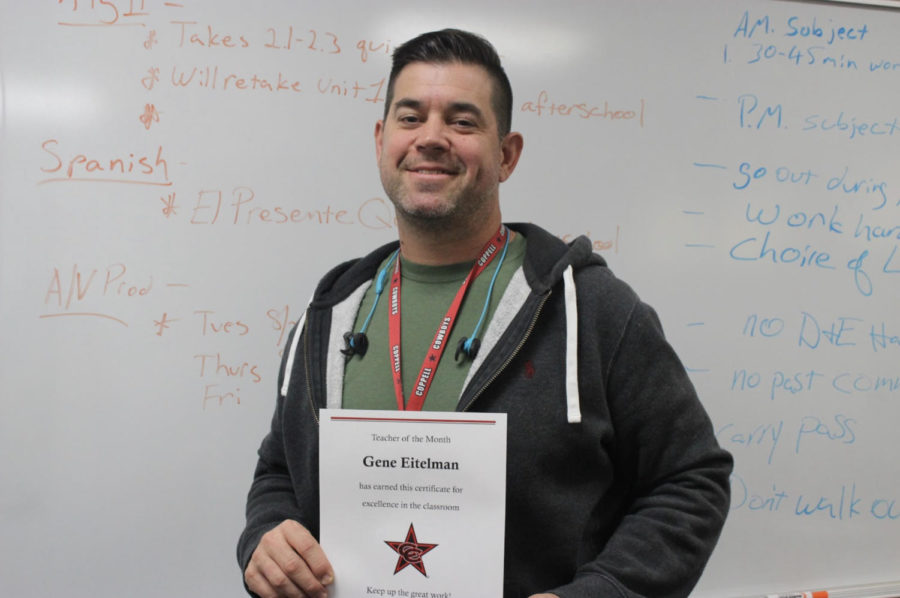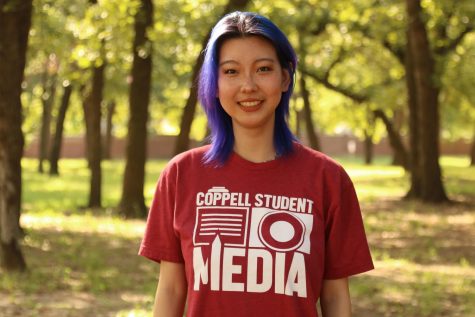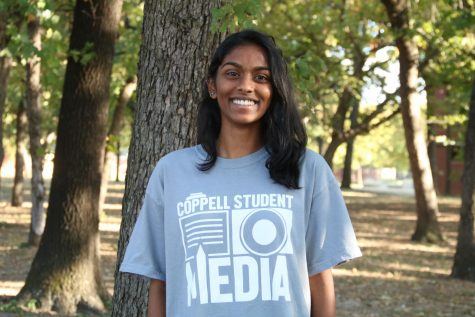Eitelman sends message of self-improvement through reflection
Coppell High School Personal and Academic Growth (PAG) facilitator Gene Eitelman receives the October Teacher of the Month award for his efforts to work with students who are in need of help with their personal and academic lives. Eitelman attempts to connect with his students by creating bonds in his classroom, an environment many students have considered a safe space.
November 8, 2019
October Teacher of the Month, Gene Eitelman, provides guidance as a Personal and Academic Growth (PAG) facilitator in room C109. Although he had a hard time determining his career pathway, he now finds fulfillment in helping students find stability in their personal and academic lives at Coppell High School, where he’s been teaching for the past eight years.
What do you do as a PAG facilitator?
We have a program for people who sometimes need specific support, or might need a place where they can go and de-escalate and kind of gather themselves again. Students get in an agitated state or need that person to just connect with and talk to, whether it be about academics or on the personal side of their life. I’m also here to help support the teachers when certain students are in class, and that student doesn’t know how to say, “Hey, emotionally, I’m kind of stuck in this rut-this hamster wheel-and I’m not going anywhere.” And so that teacher goes, “Hey, look, let’s just refocus ourselves somewhere,” and brings that student here. Students just come in [to talk], and they’ll be able to go back to class later. This isn’t a place for punishment or anything like that. People come in here to focus on academic stuff as well. If someone needs a quiet place to study or do an assignment or take a test, they’re able to come in here.
You have a bachelor’s degree in criminal justice. How did you get into education?
Desperation. It’s kind of my story. I got a degree in criminal justice, and my intentions were to become a policeman. I wanted to be a homicide investigator, that’s what I really wanted to do. Some events changed my trajectory in my younger life, and I came out to be a probation officer back home in East Texas. And then I got into insurance. My father has an insurance agency, and so I got into doing that, really just wanting to make money or to be rich. I had no intentions of helping anybody, but some changes went on in my life and chasing money wasn’t making me happy—it was making me miserable. So I was just in a period of time where I just wasn’t working. My high school principal was a very close family friend, and one day, he kind of pulled me aside and saw that I was in a rut, struggling with what I really wanted to do. He just suggested education. I had a degree, and you can get an alternative certification, so I got that. I taught for three years in East Texas, where I’m from, and I came out [to Dallas] in 2008.
What is it like working with the students that come to you for guidance?
I find a lot of fulfillment because you’ve got to get close, tight and personal with these students. I have a message I’m trying to convey to them, but sometimes that message isn’t an easy one to receive. Sometimes we have to take a look at ourselves and what’s inside, and what we see is not always pretty. You’re not going to believe what somebody says if you don’t trust them, and sometimes, getting that trust is difficult, just depending on people’s different backgrounds, or what their emotional state might be or what their preconceived notions might be. [Making] those connections, that’s the difficult part. Yet when that connection is made, when you’re able to see the fruits of the labor and see people kind of come to the realization of, “Oh, the way I’m thinking about this and going about this is wrong”. When those lights start combing on and they’re able to advocate for themselves and redirect their emotions and think in a more beneficial way, that is the joy of this job.
What is your favorite memory from your time at CHS?
I get a lot of joy hearing back from former students. I got an email from a mother and a student who just graduated from University of Kansas just a month or so ago. This student is one who really stuck out to me, who I really had a heart for. He was told things like, “You’ll never go to college, you’re not college material, you’re slow, you can’t grasp these concepts.” To see him go get accepted, go through college and then have him and his mother both separately send me an email of gratitude; there are plenty of memories of me laughing until there were tears in my eyes, or having close personal friendships with some of the other teaches, but if I had to pick, [my favorite memory] would be hearing back from my students.
What do you do in your free time?
Backpacking, fishing, hunting, outdoors shooting—those are my passions. I don’t get to do them as much anymore. Right now, I’m in the season of my life when I’ve got five kids, one who’s a senior all the way down to 2-years-old. It kind of limits me a little bit, because on weekends, the kids have soccer and dance and gymnastics and swimming and choir. There’s so many things my wife [former CHS teacher Martha Eitelman] and I have to do to logistically get all those people where they need to be. I’ve got to take my wants and my desires and kind of set them to the side. I just don’t get to do as much. I put [my family] first, but all that outdoors stuff [is still] my passion.











